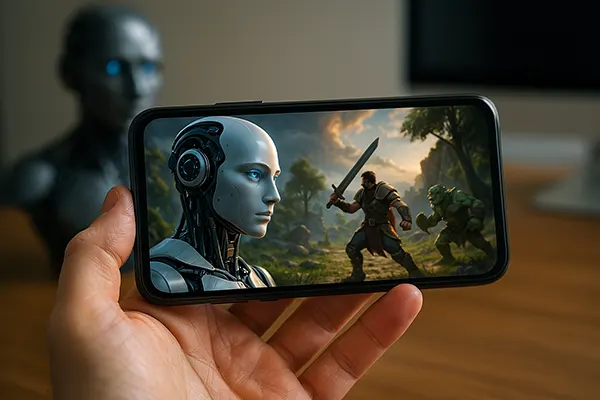AI and Mobile Gaming: How Artificial Intelligence Is Reshaping Gameplay

In recent years, artificial intelligence (AI) has become an essential driver of innovation in mobile gaming. Developers increasingly integrate AI technologies to enhance game mechanics, personalise user experiences, and adapt gameplay in real time. With the mobile gaming industry growing rapidly, understanding the impact of AI helps players, developers, and investors see the future of interactive entertainment more clearly.
Dynamic Adaptation and Personalisation in Real-Time
AI allows mobile games to adapt dynamically to players’ behaviour, preferences, and skill levels. Through machine learning algorithms, games can analyse how a user interacts with gameplay elements, then modify scenarios, enemies, or rewards accordingly. This ensures that each player’s experience feels unique, keeping the gameplay engaging and challenging without being frustrating.
For instance, in popular RPGs or battle strategy games, AI-powered systems can adjust enemy strength based on the player’s past performance. This real-time adaptability creates a more immersive and rewarding experience, as players are neither bored by too-easy levels nor discouraged by overwhelming difficulty.
Moreover, AI enhances personalisation by suggesting in-game content, purchases, or challenges tailored to the user’s habits. Recommendation engines similar to those used in streaming platforms are now integrated into games to promote offers and features that are most relevant to the player’s interests and history.
Game Design Evolves Through AI Analysis
Game developers now rely on AI tools to analyse huge datasets from player sessions, which helps in refining and redesigning gameplay. By understanding where users spend the most time or where they tend to leave the game, designers can adjust mechanics or interfaces for better retention. This approach ensures that games evolve with user feedback built directly into the analytics system.
AI also contributes to procedural content generation, where environments, levels, or even storylines are created algorithmically. This allows for more expansive and replayable games with minimal manual development, offering a broader range of experiences to each user without inflating production costs.
Ultimately, AI-driven analytics help in predicting trends and guiding strategic decisions in game development. Studios can optimise monetisation models, test features with simulated player responses, and forecast which game elements will become most popular after launch.
Enhanced NPCs and Behavioural Complexity
One of the most visible improvements in mobile games due to AI is the increased sophistication of non-player characters (NPCs). Traditional scripted behaviours are being replaced by adaptive AI systems that allow NPCs to react dynamically to players’ actions and the in-game environment. This shift makes interactions feel more lifelike and unpredictable.
For example, in stealth or strategy games, AI-driven NPCs can learn the player’s tactics over time. Instead of repeating a limited set of patterns, these characters adjust their reactions, making the gameplay more strategic and requiring real-time decision-making from users. It brings the mobile gaming experience closer to console and PC-quality complexity.
In addition, conversational AI is now embedded into some games, allowing NPCs to engage in meaningful dialogue with players. Leveraging natural language processing, these systems provide branching narratives that respond intelligently to user input, offering deeper storytelling and immersion.
AI in Competitive and Cooperative Gameplay
Multiplayer mobile games benefit from AI in both matchmaking and in-game support. AI-driven matchmaking systems assess a player’s skill level, play style, and past performance to match them with similarly skilled opponents or allies. This improves fairness and user satisfaction, reducing the chances of one-sided matches that frustrate new players or bore experienced ones.
Some titles also feature AI bots that can fill in for disconnected teammates or opponents, ensuring uninterrupted gameplay. These bots can now mimic human behaviour convincingly, learning from real players to create a seamless experience even when the player pool is limited.
Moreover, cooperative games are experimenting with AI companions that support players during missions. These companions can interpret commands, adapt strategies, and even learn from the player’s approach, providing assistance that feels far more natural than static scripted behaviour.

The Future of AI in Mobile Gaming
Looking forward, AI is expected to become even more deeply integrated into the mobile gaming ecosystem. Advances in edge computing and on-device AI mean that mobile games will no longer be limited by server latency or connectivity, allowing for more powerful real-time AI applications directly on smartphones and tablets.
AI-generated assets, including music, textures, and animations, will reduce development time and allow indie developers to compete with larger studios. Tools such as generative adversarial networks (GANs) and large language models are already being tested for creating entire game worlds with minimal human input.
Ethical considerations will also come to the forefront. As AI collects and interprets large amounts of player data to enhance gameplay, developers must ensure transparency and consent. Balancing innovation with responsible data use will define how trusted AI-powered games become in the future market.
Cross-Platform AI Integration and Player Support
AI’s potential extends beyond the game itself. Mobile titles increasingly integrate cross-platform AI systems that allow seamless progression between mobile, desktop, and console. Players can start a session on mobile and continue it on another device with consistent performance and personalisation.
Additionally, AI is transforming customer support in gaming apps. Chatbots powered by natural language processing provide instant assistance with technical issues, account management, or gameplay questions. This reduces support costs and enhances the player experience through faster resolution of issues.
In future iterations, AI may also assist with game tutorials and onboarding. Smart systems can analyse how quickly a player learns controls or mechanics and adjust the tutorial pace accordingly. This personalised onboarding can drastically improve retention rates for complex games.



